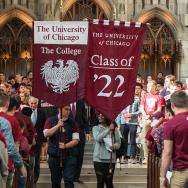To borrow the words of Walt Whitman, the University of Chicago’s Class of 2022 contains “multitudes”—from artists and athletes to mathematicians and activists.
But the common denominator across UChicago’s first-year students is an irrepressible sense of curiosity. Below are some of their stories:
Aryan Kejriwal

When it comes to the classic 3x3 Rubik’s Cube, Aryan Kejriwal will tell you that he’s only “decent.” He’s ranked around 200th in the world.
But the 7x7 cube—a block the size of a grapefruit with possible combinations numbering in the sexvigintillions (10 to the 81st power)—is another story. With a competition time of 2 minutes, 10 seconds, Kejriwal ranks seventh in the World Cube Association.
Kejriwal, a prospective mathematics major, feels he’s found the perfect niche in UChicago. He remembers sitting in on a math class while visiting campus as a prospective student, and seeing a student’s counter-argument prompt a back-and-forth debate with a professor. “It kept going on, and that was what was so beautiful to me. It’s that your thoughts are embraced. It’s just focused on questioning—questioning what you know.”
The same spirit drives Kejriwal’s determination to beat his 7x7 score. “When you sit over the summer and really just make sure you know it well—that’s the boring part. When you go to a competition and win—that’s not the real beauty of this hobby. The beauty, in my opinion, is getting to sit down with a cube and figure out how to get faster.”
Kejriwal intends to raise the profile of cube-solving on campus, with a competition he’s organizing slated for Winter Quarter. In the meantime, when not mulling over proofs, he’ll keep practicing. “That critical thinking—and inquiry, as UChicago says—is something that I just breathe. Something that I just do all the time.”
Karen Ma

For Bay Area native Karen Ma, badminton hasn’t just been a sport—it’s “been probably the biggest part of my life,” she said.
For years, Ma balanced journalism, classwork and playing on her high school team with club badminton, which brought her to tournaments across the nation. The most memorable opportunity came her junior year, where she joined a team of four girls and four boys to represent the United States at the BWF World Junior Championship in Bilbao, Spain.
“We got to see people from Denmark and Germany, these powerhouses,” Ma recalled. “They were so good—we got crushed. But it was so, so fun.”

Off the court, Ma enjoys going to concerts—she lists this year’s Lollapalooza as one of the best experiences of her life—and spending time outdoors. Two years back, she enrolled in a research program at Glacier National Park that taught her about the importance of maintaining biodiversity in vulnerable habitats. While researching the spread of lake trout, an invasive species in Montana, Ma learned “something that most people don't really consider when thinking about protecting our environment, which is [that] native species are threatened by not only our actions as humans, but also other nonnative species.”
At UChicago, Ma is deeply interested in economics: “I like the fact that it’s a mesh between social sciences and sciences, and that it helps you get an idea of the world and how people behave,” she said. But she’s excited to try new things at UChicago—and waiting to see if the “Human Being and Citizen” sequence really will change her life, as an upperclassman suggested.
Abed Alsolaiman

Abed Alsolaiman can’t remember whether he first heard of UChicago from a friend’s older brother or from a mailing pamphlet. But the more he researched it, the more confident he was that it was the place for him: “I consider myself a fan of intellectual conversations, and I’d heard there's a lot of them here,” he joked.
Alsolaiman hails from Salt Lake City, but he has always felt close to his family’s Syrian roots. In the ninth grade, he had the opportunity to explore this heritage firsthand, when his mother’s work with a humanitarian relief group brought him to Gaziantep, Turkey, a city about an hour from the Syrian border.
For a year, Alsolaiman enrolled in a school for displaced Syrian children, meeting people that had escaped the conflict and making friends he keeps in touch with today. Upon returning to Utah, he found that his time in Gaziantep had kindled a passion for social justice—so he found and formed new avenues for civic work across Salt Lake City. Over the course of high school, Alsolaiman helped organize fundraising dinners in support of victims of the Syrian conflict, worked with the ACLU of Utah and supported the Salt Lake Peer Court, a restorative justice organization which redirects underprivileged youth with petty crime charges away from the juvenile justice system.
“I consider myself a fan of intellectual conversations, and I’d heard there’s a lot of them here.”
Now that he’s in Chicago, Alsolaiman intends to dig deeper into the intersection of economics, social justice and politics. In particular, the city’s housing debate has caught his attention: “I think when we talk about social justice, you have to focus on the economic aspects of what’s hurting disadvantaged communities. What were the historical causes of this, and how can we remedy it?”
For the time being, he’s getting used to life in Burton-Judson, focusing on his coursework, and reminding everyone to vote in the primaries.
“Yes, the world can be overwhelmingly pessimistic, and for good reason—things sometimes don’t seem super great,” he said. “But I think so much of this work is just getting people to realize their role in the greater mechanics of society—and what it can be.”
Shivanii Batra

When Shivanii Batra participated in The New York Times’ 2015 summer reading contest—a program in which the paper invites feedback from teenage readers—the presidential election cycle was just getting started. So she took the opportunity to share a perspective from Dallas, where “it [was] pretty much Democrats vs. Republicans and nobody really accomplishing anything.”
Batra’s commentary didn’t just earn her a spot on The New York Times’ inaugural Student Council, for which she discussed news features and current affairs with other teenagers—it inspired her unique approach to analyzing politics from all angles.
Last summer, Batra was accepted to a Washington, D.C. program run by conservative Congressman Pete Sessions, who represents a Dallas district. A few months later, Batra interned with Ed Meier, who ran for Sessions’ seat in the Democratic primary.
“That really sparked my interest, because I got to see both sides,” she said.
At UChicago, Batra is considering the economics and political science majors. But she also wants to make a more immediate impact—and has found an outlet in Pi Beta Phi, whose advocacy for childhood literacy feels like a natural next step from her own experience as coordinator of an elementary school tutoring program in Dallas.
“That really sparked my interest, because I got to see both sides.”
In the meantime, she’ll continue to explore life on campus and Chicago at large, where she feels “kind of cool coming from the South.”
As she puts it: ”I’ve never had pride about my state. I didn’t like it when I was there, but here, I’m kind of into it.”
Julian Spencer

“Animal Jam,” an online multiplayer game about environmentalism developed by National Geographic, resembles its peers (say, “Club Penguin”) at first glance. But for Julian Spencer, there’s a whole world beneath the cartoonish surface.
Since his childhood in Bethesda, Maryland, Spencer has been fascinated with the game’s mechanics—from lore and glitches to internal economies. So he began to post video commentary to YouTube, trading the technical focus of eSports for philosophy and meta-commentary. By the time Spencer called it quits on YouTube, this one-time hobby had brought him 210,000 subscribers and 50 million views.

But it’s the way his videos inspired young people to be curious about environmentalism and computer science that Spencer remembers most fondly. “To study a world that is totally a representation of everyone’s minds working together is one of the deepest ways to get a look at the human perspective,” he said.
Through he’s moved on from Animal Jam, Spencer remains creative as a pianist, new member of Fire Escape Films and devoted baker (carrot cake is his specialty). A student-athlete, he’s also on UChicago’s swim team.
Not everything Spencer does is productive, but he’s found value in sidesteps and new explorations. “Life is about progress, but life is also about life.”









